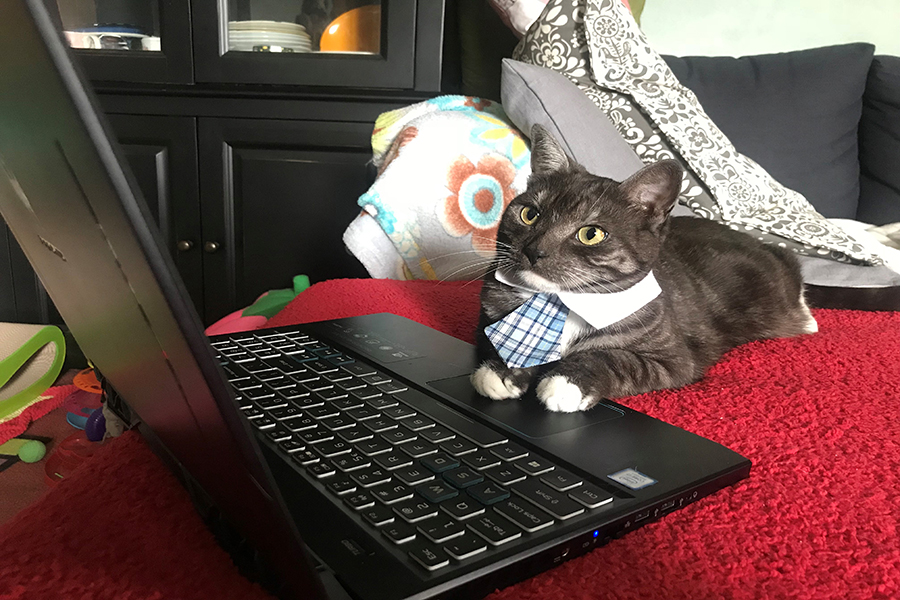
Coronavirus: cats during the crisis

By ALEXI DEMETRIADI
It is not just humans that have been forced inside with the outbreak of COVID-19, but also ‘man’s best friend’ – the humble cat. As workers across Sydney have had to work from home and limit outdoor activity, so too have animal shelters across the city. The effect of the virus and its implications does not stop with the citizens of Sydney but includes their pets too.
RSPCA coronavirus response
The RSPCA NSW recently released a statement outlining how the virus would affect their normal operations and how they have tried to mitigate the implications. New logistical measures were announced, including limiting opening hours of premises, utilising only essential staff and making an initial form mandatory if you wish to adopt a pet.
The RSPCA also provided an update to individuals uncertain of the implications of the virus for them and their pets. “The Australian Veterinary Association has released a statement stating that the primary source of COVID-19 transmission remains human-to-human contact,” read the announcement. “This is corroborated by the Centres for Disease Control and Prevention (CDC) which states that at this time, there is no evidence that companion animals, including pets, can spread COVID-19.”
However, all parties acknowledge that information on the virus is still evolving. If you do fall ill it is encouraged that you minimise close contact with pets and practice good hygiene around them.
Cat shelters weathering the virus
The Cat Protection Society of NSW is located on Enmore Road, and what began in 1958 has become one of the longest running and most popular cat shelters in Sydney. But the coronavirus pandemic may prove to be the most difficult point in its history.
“We stopped doing adoptions a couple of weeks ago and even then, we scaled it down to appointment-only, one family at a time, long spacing between appointments and thorough cleaning in-between showings,” Kristina Vesk, CEO of Cat Protection, told City Hub. “We wanted to try and get as many cats into homes as possible – but we can’t continue to do that anymore at this time.”
With safety in mind, the shelter had to stop allowing adoptions. The popular shop attached to the shelter has temporarily closed, apart from in certain cases. “We’ve got a lot of regular customers for cat food and cat litter,” said Vesk. “We’ve said that if they can ring ahead and pay over the phone, we can pack it up for them and deliver them at the door if necessary.”
Vesk explained that safety has rightly had to take precedence. “We’ve had to juggle around the way we do things – we’ve got rotating shifts of staff and a lot of people working from home,” she said. “We’re really well vested in infection control to begin with, this is not a new concept for us – but it does change things when you have to avoid your colleagues as well!” Vesk reiterated that regardless of the virus, all the cats are receiving exceptional care and “lots of love.”
The number of cats in lockdown at Cat Protection receiving ‘coronavirus care’ is around 120, but that number could have been greater if the virus had hit earlier. “One of the positives is that we’re at the tail end of kitten season,” Vesk explained. “The absolute peak of the season has mainly gone, so over January and February we homed around 300 kittens.”
A pet is for life, not just for quarantine
Vesk warned of the problems of adopting a pet for the quarantine period, without a clear plan to look after the animal once the virus recedes. “Fostering is great, but those animals adopted now will still need homes once this is over,” she said. “There are some positives at the moment, but it is important to be careful that we continue to look after pets.”
Vesk explained that a wonderful amount of bonding and companionship can be had with your pet during this time but encouraged those doing supermarket runs for friends and family to not forget about the animal. “Don’t forget to ask about their pets,” Vesk said. “Don’t forget to ask if they need a kitty litter, cat food or items like that.”
The climate after coronavirus poses just as many challenges for Cat Protection as the present does. “I know that the economy has a huge impact on pet ownership,” said Vesk “That can range from people who can’t afford to look after pets, to maybe they’ve had to move, and they can’t find anywhere that allows animals.”
Vesk encouraged landlords to become ‘pet friendly’ during and immediately after the pandemic. “We’re going be in an economic downturn for some time and that is going to affect pet ownership,” she said. “We plead to landlords to make their properties pet friendly – so that people don’t have to suffer giving up their pet.”









